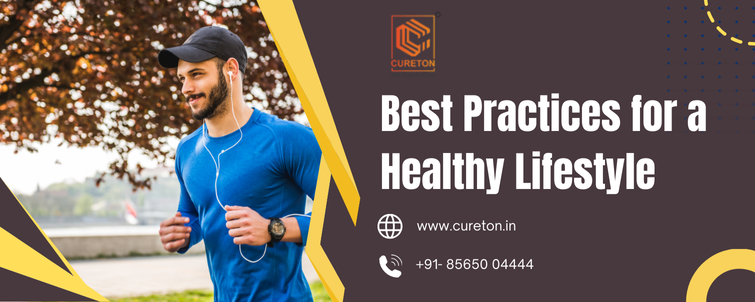Best Practices for a Healthy Lifestyle: Cureton Biotech
Leading a healthy lifestyle is essential for achieving overall well-being and longevity. It encompasses various aspects, including nutrition, physical activity, mental health, and sleep. Here, we’ll delve into best practices for a healthy lifestyle help you adopt and maintain a healthy lifestyle, providing practical tips to support your journey.
1. Balanced Nutrition
Nutrition is the foundation of a Best Practices for a Healthy Lifestyle. Eating a balanced diet ensures your body gets the essential nutrients it needs to function optimally.
Key Nutritional Components
- Variety of Foods: Include a wide range of fruits, vegetables, whole grains, lean proteins, and healthy fats.
- Portion Control: Pay attention to portion sizes to avoid overeating. Use smaller plates and be mindful of serving sizes.
- Hydration: Drink plenty of water throughout the day. Aim for at least eight glasses, and more if you’re physically active.
Practical Tips
- Meal Planning: Plan your meals in advance to ensure a balanced diet and to avoid last-minute unhealthy choices.
- Healthy Snacks: Keep nutritious snacks like nuts, fruits, and yogurt on hand to curb hunger between meals.
- Limit Processed Foods: Reduce intake of processed foods high in sugar, salt, and unhealthy fats.
2. Regular Physical Activity
Exercise is crucial for maintaining physical health, managing weight, and boosting mental well-being.
Types of Exercise
- Cardiovascular Exercise: Activities like walking, running, swimming, and cycling improve heart health and endurance.
- Strength Training: Incorporate weight lifting or body-weight exercises like push-ups and squats to build muscle and bone strength.
- Flexibility and Balance: Practices such as yoga and Pilates enhance flexibility, balance, and core strength.
Practical Tips
- Consistency is Key: Aim for at least 150 minutes of moderate-intensity exercise per week, or 75 minutes of vigorous-intensity exercise.
- Mix It Up: Vary your workouts to keep things interesting and work different muscle groups.
- Set Realistic Goals: Start with achievable goals and gradually increase intensity and duration as your fitness improves.
3. Mental Well-Being
Mental health is as important as best practices for a healthy lifestyle. Taking care of your mental well-being can reduce stress, improve mood, and enhance your overall quality of life.
Mindfulness and Meditation
- Daily Practice: Spend a few minutes each day practicing mindfulness or meditation to reduce stress and increase focus.
- Deep Breathing: Use deep breathing exercises to calm your mind and body during stressful situations.
Social Connections
- Stay Connected: Maintain regular contact with friends and family to build a supportive network.
- Join Groups: Participate in social or hobby groups to meet new people and engage in activities you enjoy.
Seek Professional Help
- Therapy and Counseling: Don’t hesitate to seek professional help if you’re feeling overwhelmed, anxious, or depressed.
- Medication: Consult a healthcare provider for appropriate medications if needed.
4. Quality Sleep
Good sleep is vital for physical health, mental clarity, and overall well-being. It allows your body to rest, repair, and rejuvenate.
Sleep Hygiene
- Regular Sleep Schedule: Go to bed and wake up at the same time every day, even on weekends.
- Relaxing Bedtime Routine: Establish a calming pre-sleep routine, such as reading or taking a warm bath.
Optimal Sleep Environment
- Comfortable Bedding: Ensure your mattress and pillows are comfortable and supportive.
- Dark and Quiet: Keep your bedroom dark, quiet, and cool to promote better sleep.
Avoid Sleep Disruptors
- Limit Caffeine and Alcohol: Avoid consuming caffeine and alcohol close to bedtime.
- Screen Time: Reduce exposure to screens at least an hour before bed.
5. Preventive Health Care
Regular check-ups and preventive care are essential for early detection and treatment of potential health issues.
Routine Check-Ups
- Annual Physicals: Schedule yearly check-ups with your primary care physician.
- Screenings: Get regular screenings for blood pressure, cholesterol, and blood sugar levels.
Vaccinations
- Stay Up-to-Date: Ensure you are current on vaccinations, including flu shots and others recommended by your healthcare provider.
Healthy Habits
- Handwashing: Regular handwashing can prevent the spread of many illnesses.
- Dental Care: Brush and floss daily and visit the dentist regularly.
Conclusion : Best Practices for a Healthy Lifestyle
Adopting a healthy lifestyle requires a balanced approach that includes proper nutrition, regular physical activity, mental well-being, quality sleep, and preventive health care. By incorporating best practices for a healthy lifestyle into your daily routine, you can achieve and maintain overall wellness. Remember, it’s important to tailor these tips to your individual needs and consult with healthcare professionals to support your journey towards a healthier life.

Contact information
Contact Cureton Biotech if you want any details regarding the Best Practices for a Healthy Lifestyle or any other part of PAN India.
Contact Person: Mr. Sanchit Rana
Company name: Cureton Biotech
Ph: +91- 85650 04444
Company Address: B- 166, T.F , DDA Shed, Okhla Industrial Phase- 1, New Delhi- 110 020
Manufacturing Address: 251- 253 Sisona Bhagwanpur Roorkee- 247 661, Uttrakhand
Email Address: info@cureton.in , curetonbiotech@gmail.com
Website: www.cureton.in
FAQ
Q1: What are the best practices for a healthy lifestyle?
A: Maintain a balanced diet, exercise regularly, prioritize mental health, ensure quality sleep, and engage in preventive health care.
Q2: How can I improve my nutrition as part of best practices for a healthy lifestyle?
A: Eat a variety of whole foods, avoid processed items, and stay hydrated.
Q3: What types of physical activity are recommended in best practices for a healthy lifestyle?
A: Mix aerobic exercises, strength training, and flexibility exercises.
Q4: How can I prioritize mental health in the best practices for a healthy lifestyle?
A: Practice mindfulness, enjoy hobbies, maintain social connections, and manage stress.





